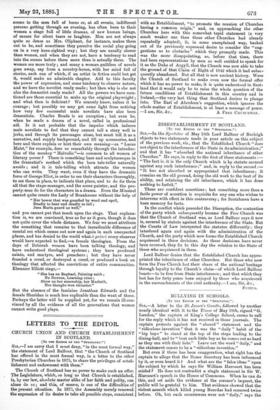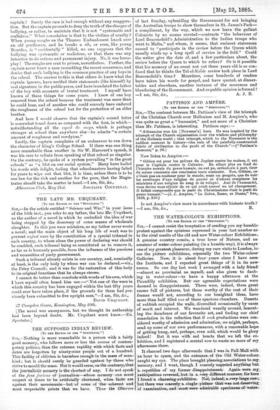BULLYING IN SCHOOLS.
ITO THE EDITOR OF THE " SPECTATOR." J
Sia,—A letter to the St. James's Gazette, followed by another nearly identical with it to the Times of May 18th, signed " G. Landon," the captain of King's College School, seems to call for the reply which it has not received in those journals. The captain protests against the " absurd " statement and the "ridiculous invention" that it was the " daily " habit of the "big boys" to stand at the top of the steps leading to the dining-hall, and to " beat each little boy as he comes out as hard as they can with their fists." Leave out the word "daily," and the statement ceases to be a " ridiculous invention."
But even if there has been exaggeration, what right has the captain to allege that the Home Secretary has been influenced by it, or even heard it ? And what are the " false ideas " upon the subject by which he says Sir William Harcourt has been misled P He does not contradict a single statement in Sir W. Harcourt's speech in the House of Commons. When he can do this, and set aside the evidence at the coroner's inquest, the public will be grateful to him. That evidence showed that the violent assault which killed young Bourdas had occurred twice before. Oh, but such occurrences were not " daily," says the
captain ! Surely the case is bad enough without any exaggeration. But the captain proceeds to deny the truth of the charges of bullying, or rather, to maintain that it is not " systematic and malicious." What consolation is that to the victims of cruelty ? When young roughs on the Thames Embankment knock over an old gentleman, and he breaks a rib, or even, like young Bonrdas, is " accidentally " killed, no one supposes that the bullying was systematic or malicious, or that there was any intention to do serious and permanent injury. No, it was horseplay ! The roughs are sent to prison, nevertheless. Further, the captain never knew a case-resembling the recent occurrence, and denies that such bullying is the common practice of any boys in the school. The answer to this is that others do know what the captain ignores, have verified their statements (like himself) by real signature in the public press; and have inundated the father of the boy with accounts of brutal treatment. I myself have known of these things for some years. I knew of one boy removed from the school because thetreatment was more than he could bear, and of another who could scarcely have endured the roughness of the school but for the protection of an elder brother.
And here I would observe that the captain's second letter is somewhat toned down as compared with the first, in which— notwithstanding all the esprit de corps, which is perhaps stronger at school than anywhere else—he admits "a certain amount of roughness and rowdyism."
Lastly, the captain complains of an endeavour to run down the character of King's College School. If there was one thing more remarkable than another in Sir W. Harcourt's speech, it was his care to refrain from speaking of that school as singular. On the contrary, he spoke of a system prevailing" in the great schools " as " a blot on our social system." Many have hailed his words with delight, feeling that schoolmasters having failed for years to wipe out that blot, it is time, unless there is to be one law for the rich and another for the poor, that the Magistrates should take the matter in hand.—I am, Sir, &c., Atheneum Club, May 21st. JOSCELINE COURTENAY.



































 Previous page
Previous page